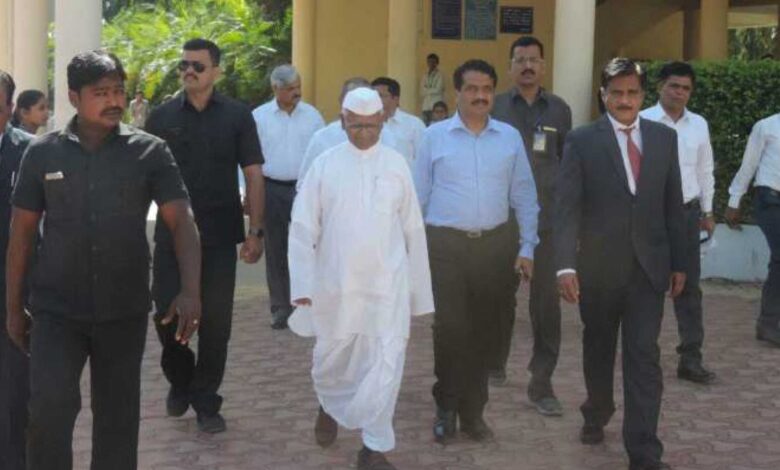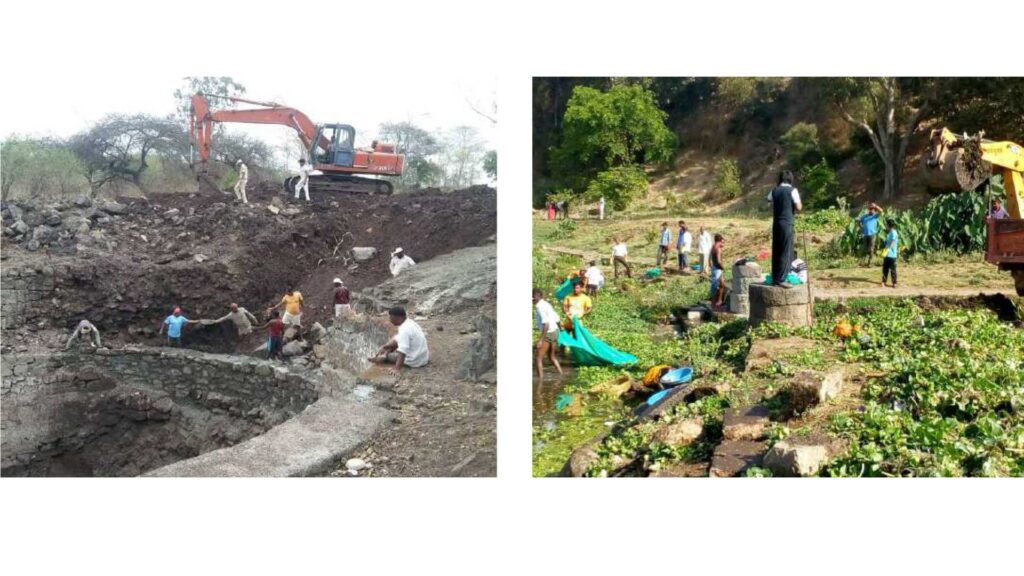The Far Reaching Impact of Water Scarcity

A Closer Look at Life, Migration, Health, Education, Economy, Society, and Culture
He is a civil engineer, has been a water activist and has been working in the field of water conservation for more than a decade. He is the editor of the monthly ‘Jalsanvad’ publication running for the last 17 years & dedicated to Water issues only. A true Punekar at heart, he’s been guiding several govt and non-government organizations to create awareness and actionable steps in this domain. His contribution as a member and president of the Rotary Club has been exemplary. He is a core Team member of Jalbiradari, Maharashtra and is the district director for water and sanitation for 2021- 22. He is also the author of the book ‘Abhinav Jalnayak’.
This year once again the arrival of rains has been delayed. confirming the forecasts of the Meteorological Department regarding a decrease in rainfall. This situation has raised concerns among people about the upcoming monsoon season and the potential difficulties in terms of water availability for the next year. We can only hope that this year brings adequate rainfall.
The worries of the people are not unfounded, as rain and water have a significant impact on everyone’s lives in various ways. Rain is not solely crucial for farmers; it profoundly affects life, health, education, economy, society, culture, and peace.
Rain & Life
Life essentially illions of years due to water. However, without rain or sufficient water in the soil or on the ground, the roots of large trees and crops lack the necessary water, leading to their death. Animals also suffer greatly, with those in forests dying of thirst. Domesticated animals receive some support from humans due to their economic value, but non-productive domestic animals often perish.
The scarcity of water brings about significant changes in people’s lives, such as water scarcity, infertility of the land, food and water shortages, poor health, malnutrition, and more. Financial stability becomes distant, often leading to large- scale migration.
Migration
Migration is a global issue affecting countries worldwide. It represents one of the most significant and consequential events in human affairs. According to a report by the United Nations, one-third of the world’s population has been forced to migrate due to water scarcity in the last fifty years. By 2030, it is projected that 66% of the world’s population will have to leave their homes, villages, states, or even countries in search of water. The severity and extent of migration due to water-related issues are expected to increase significantly, causing various social and economic problems.
Health
Even today, only a small percentage of the global population, around fifteen to sixteen per cent, has access to safe drinking water. Contaminated and polluted water is responsible for 70% of human diseases. While epidemics have been brought under control to some extent in recent decades, many diseases are still linked to water pollution. Serious health conditions, including cancer, can be attributed to the problem of polluted water.
Education
Migration due to water scarcity leads to a universal picture of educational loss. Additionally, the lack of water and resulting infertility and poverty restrict educational opportunities, with education often limited to the tenth grade. Only 13% of students who reach the tenth grade continue their education at higher levels. The government’s claim of a 90% literacy rate fails to account for out-of-school children and school dropouts. Girls, in particular, are significantly affected by school dropout rates due to the absence of water-fetching facilities at home and inadequate sanitation in schools.
Economy
In India, agriculture remains the primary source of income for 62% of the population, and agriculture relies heavily on water availability. Without rainfall, crops cannot grow, leading to zero purchasing power
for farmers and agricultural labourers. Consequently, goods cannot be sold within villages, negatively impacting manufacturing and all other types of businesses. The economic consequences extend from the individual and village level to the state and national levels. Given India’s size, droughts occur in some four to seven states every year, severely affecting GDP, banking, and all aspects of the economy. In short, the absence of rain and water significantly hampers the economy.
Public Health and Peace
Barrenness-induced migration disrupts families, communities, and villages, leaving societies dejected and depressed. Lack of employment opportunities and the loss of aspirations often lead to dissatisfaction, marches, riots, theft, and increased crime rates. Both rural and urban societies experience the strain caused by migration. Even after migrating to cities, these individuals struggle to build a better life. Moreover, migration places an overwhelming burden on urban areas, straining infrastructure and facilities and adversely impacting overall societal health.
Culture
Cultural development and prosperity do not occur in isolation; rather, they thrive in a favourable environment. However, migration separates communities, hindering the celebration of traditional festivals and customs that mark moments of joy, sadness, and significance. Consequently, subsequent generations lose awareness of these cultural practices, leading to the disappearance of folk art and literature. Innovation in art, literature, and traditional sciences comes to a halt at both the individual and collective levels. Rain and water are interconnected with every aspect of creation and society.
In summary, the scarcity and contamination of water have far- reaching consequences on various aspects of life, including health, education, economy, society, and culture. Urgent measures are needed to address the water crisis and mitigate its severe impact on humanity.

The JSPL Foundation addresses some of India’s most pressing development challenges in various fields such as Healthcare and Nutrition, Skill Development and Education, Sanitation and Hygiene, Women Empowerment, promoting Art and Culture, and Sports.
In tandem with the ‘FICCI Vision 2030 for Higher Education in India’, OPJU believes to impart higher education having global relevance and competitiveness, which aims not only to be the best in the world but also the best for the world. Our university is surrounded by approximately 100 industries because we feel that sustainable excellent higher education in engineering sectors cannot be possible without industry connection from the very early stage of B. Tech. All students undergo 02 months of full-time industrial training at JSPL, JPL, and other companies in OPJU. The university promotes long-term (6-12 months) industry internships. More than 70 % of long-term internships come with a pre-placement offer. Overall, 82% of the students have been placed, even during the Covid-19 upsurge.
Another pivotal aspect of OP Jindal University is providing higher education in an affordable capacity, mostly in the tribal belt of India (Chhattisgarh, Orissa, Jharkhand, Bihar). The university offers multi- layered scholarships to meritorious students so that financial matters should not be a hindrance to higher education.
In OPJU, we aim to ignite and educate young minds so that they contribute to the nation’s development. OP Jindal University, known as the University of Steel Technology and Management, is the only university in India catering to the need of the steel and power industries. Within a very short span of our journey, we received national and international recognition. OPJU has received the Best University of CG award from the Hon’ble Chief Minister of Chhattisgarh along with Best Industry Connect (Featured in AICTE CII 2020), to name a few.
OPJU is a multidisciplinary university of choice to develop future leaders beyond boundaries. We create and support the next generation of ambitious innovators and entrepreneurs and encourage them to translate ideas into start-ups.
The OPJU is spread across a residential campus of 34 acres and with over 300,000 square feet of academic space, student residences to house more than 1000 students, and extensive facilities for students, staff, and faculty; University offers UG, PG, and Ph. D programs across all its schools, like School of Engineering (SOE) offers Diploma, B.Tech, M.Tech, PhD in Mining Engineering, Metallurgical & Materials Engineering, Mechanical Engineering, Civil Engineering, Electrical Engineering, Computer Science & Engineering. School of Management (SOM) offers MBA, Executive MBA, BBA, BA Economics (H), Bcom (H), and PhD in Marketing, Finance, HR and Operations, and Family Business. We also have a “Student Exchange Program” with Jindal Global University (JGU). School of Science (SOS) offers BSc. (Hons.), MSc., and PhD in Physics, Chemistry, Mathematics, Biotechnology, Data Science and Analytics & Humanities.
One of our unique initiatives is the Centre of Sustainable Technology and Product Development (CSTPD) which conducts research on reducing carbon footprint and thereby promoting green steel- making.
We are crafting the vision of our Hon’ble Chairman Mr. Naveen Jindal with respect and vigour by developing state-of-art laboratories with modern equipment and the latest software. We are in the process of recruiting competent faculty with international exposure, establishing multiple centres of excellence, adopting ‘doing by doing’ teaching pedagogy, designing industry and research-linked curricula, harnessing national-international collaborations and tie- ups, promoting research, and focusing on career development of the students through training & compulsory industry internships.
Additionally, we encourage our students to participate in sports and games with the aim of lopping the students holistically. We want to channel young minds towards constructive direction through sports. Sports are known to boost alertness, disciple, team spirit, mental ability, confidence, and concentration in the students for a better tomorrow.
Higher education institutions can offer a strong potential for contributing to development. Throughout the history of humankind, institutions of higher learning have played an important role in society by educating the people and serving the communities. The work done by OPJU and the achievements demonstrates the sincerity and strength of OP Jindal University. However, the university is aware that it must do a lot more. The university is committed to delivering the best to society and it will be able to achieve the highest level of teaching and research in technology, management, science, and community services.



